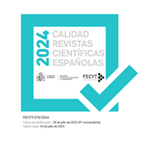Estudio comparativo de los índices de madurez sintáctica entre las generaciones pre y posinternet
Resumen
Este trabajo muestra un análisis comparativo de los índices de madurez sintáctica entre estudiantes de los años 90 del siglo pasado y estudiantes que han crecido en la era digital, nacidos en los años 1996, 2000 y 2004. La hipótesis principal es que los índices de madurez sintáctica habrían descendido ligeramente en la generación posinternet debido a la rapidez de la escritura y la inmediatez de respuesta que se emplean en el lenguaje de las TIC. Se han analizado 382 redacciones de alumnos de 4º curso de Educación Primaria (9 años), 2º curso de Educación Secundaria Obligatoria (13 años) y 2º curso de Bachillerato (17 años). Los resultados muestran que la generación posinternet obtiene índices más altos en la mayoría de parámetros analizados. De ahí se concluye que la exposición a las TIC no afecta negativamente a la madurez sintáctica de niños y adolescentes en los términos cuantitativos analizados
Descargas
Descarga artículo
Licencia
La revista Círculo de Lingüística Aplicada a la Comunicación, para fomentar el intercambio global del conocimiento, facilita el acceso sin restricciones a sus contenidos desde el momento de su publicación en la presente edición electrónica, y por eso es una revista de acceso abierto. Los originales publicados en esta revista son propiedad de la Universidad Complutense de Madrid y es obligatorio citar su procedencia en cualquier reproducción total o parcial. Todos los contenidos se distribuyen bajo una licencia de uso y distribución Creative Commons Reconocimiento 4.0 (CC BY 4.0). Esta circunstancia ha de hacerse constar expresamente de esta forma cuando sea necesario. Puede consultar la versión informativa y el texto legal de la licencia.











